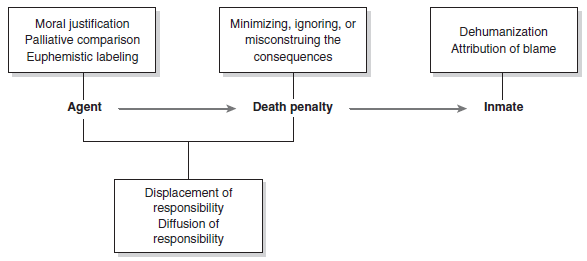Judges Instructions in Capital Cases
Research has shown that jurors in many types of cases frequently fail to understand the jury instructions they receive. However,...
Read More
Death Qualification of Juries
Death qualification is a unique form of jury selection that is used only in capital cases. Potential jurors are screened...
Read More
Competency for Execution
The Eighth Amendment to the U.S. Constitution prohibits cruel and unusual punishment, which, according to the U.S. Supreme Court decision...
Read More
Checklist for Competency for Execution
To date, very few instruments have been developed for the purpose of assisting evaluators in the assessment of competency for...
Read More
Capital Mitigation
Capital mitigation consists of evidence that is presented in a death penalty trial to obtain a sentence other than death....
Read More
American Bar Association Resolution
The question of how individuals with severe mental disabilities should be sentenced when they are convicted of capital (death penalty)...
Read More
Aggravating / Mitigating Factors Evaluation
If a defendant is found guilty of a capital crime, the triers of fact are called on to weigh the...
Read More
Aggravating and Mitigating Factors Effect
Aggravating factors are elements of the crime or the defendant’s prior criminal record that not only make the defendant eligible...
Read More
Moral Disengagement and Execution
People ordinarily refrain from behaving in ways that violate their core moral standards because such conduct will bring self-censure. In...
Read More
Validity Indicator Profile
The validity indicator profile (VIP) is a measure of response validity that is intended to be administered concurrently within a...
Read More
Test of Memory Malingering
The issue of malingering is becoming increasingly important in the field of forensic psychology, particularly in cases involving traumatic brain...
Read More
Structured Interview of Reported Symptoms
The Structured Interview of Reported Symptoms (SIRS) is a fully structured interview that is designed to assess feigned mental disorders...
Read More
Public Opinion About the Courts
The study of public opinion about the courts is closely tied to concerns that date back to the Constitutional Convention....
Read More
Race Impact on Juries
The relationship between race and the decision making of juries is complex and controversial. Media and public discussions of the...
Read More
MMPI-2 Validity Scales
A strength of the Minnesota Multiphasic Personality Inventory-2 (MMPI-2) is its multiple indicators regarding an examinee’s approach to the test....
Read More
Scientific Jury Selection
Scientific jury selection (SJS) is the use of a survey to decide which jurors to favor in a trial. Prior...
Read More
Sexual Harassment Evaluation
Research examining juror decisions in sexual harassment has generally found a relationship between juror gender and liability decisions, in that...
Read More
Millon Clinical Multiaxial Inventory-III
The Millon Clinical Multiaxial Inventory-III (MCMI-III) is a 175-item self-report inventory designed to assess personality characteristic and psychopathology. It has...
Read More
Statistical Information Impact
Statistical information is increasingly likely to be presented in court. It may appear in civil cases (e.g., percentages of men...
Read More
Stealing Thunder
In the context of the courtroom, “stealing thunder” refers to revealing damaging information first so as to diffuse its impact....
Read More
Mens Rea and Actus Reus
To obtain a criminal conviction, the prosecution must establish the presence of two elements at the time of the crime—namely,...
Read More
Story Model
To better explain how jurors make decisions in trial, psychologists have proposed a variety of decision-making models. Some research has...
Read More
Malingering Probability Scale
The Malingering Probability Scale (MPS) was developed in the mid-1990s as a self-report instrument to estimate the probability of malingering,...
Read More
Translated Testimony
As society becomes increasingly more diverse culturally and linguistically, translated testimony will become a more frequent component of the American...
Read More
Perseveration
Perseveration, a cognitive phenomenon with implications across various domains of psychology, serves as a fascinating subject of inquiry in the...
Read More
U.S. Supreme Court
The U.S. Supreme Court conducts appellate review hearings of lower-court decisions, relying on written briefs and oral arguments by counsel...
Read More
Preschoolers
This article on preschoolers offers a comprehensive exploration of the developmental milestones, learning and education, challenges, and considerations related to...
Read More
Victim Impact Statements
Most states allow victims and/or victims’ survivors to speak during the sentencing phase of trials as to the pain they...
Read More
Sensorimotor Stage of Development
The Sensorimotor Stage of Development, a pivotal component of Jean Piaget’s theory of cognitive development, represents the initial phase in...
Read More
M’Naghten Standard
The M’Naghten Standard is a legal test to guide juries and courts in their determination of whether a defendant should...
Read More
Witness Preparation
The term witness preparation refers to any type of advice or training given to someone who is going to give...
Read More
Stages of Moral Development
This article on stages of moral development delves into the foundational theories and contemporary perspectives surrounding the evolution of moral...
Read More
Interdisciplinary Fitness Interview
The Interdisciplinary Fitness Interview (IFI) is a semi-structured assessment device designed to help examiners explore systematically the domain of psycholegal...
Read More
Wrongful Conviction
The emergence of forensic DNA analysis in the late 1980s has enhanced the criminal justice system’s ability to find the...
Read More
Stages of Psychosocial Development
In this article, we delve into the stages of psychosocial development as proposed by Erik Erikson, a pivotal figure in...
Read More
Insanity Defense Reform Act
The Insanity Defense Reform Act (IDRA), passed by Congress in 1984, imposed a uniform standard for legal insanity that applies...
Read More
Attachment Styles
The concept of attachment was introduced into psychiatry and psychology by John Bowlby, a British psychoanalyst whose major books appeared...
Read More
Theories of Human Development
This article delves into the multifaceted world of human development theories, exploring the intellectual legacies of prominent theorists who have...
Read More
Hopkins Competency Assessment Test
The Hopkins Competency Assessment Test (HCAT) was developed as a brief screening measure for assessing a patient’s capacity to provide...
Read More
Authoritarian Personality
Authoritarian Personality Definition The authoritarian personality describes a type of person who prefers a social system with a strong ruler—...
Read More
Comorbidity
Comorbidity, the concurrent presence of two or more distinct medical or psychiatric conditions within an individual, is a complex and...
Read More


